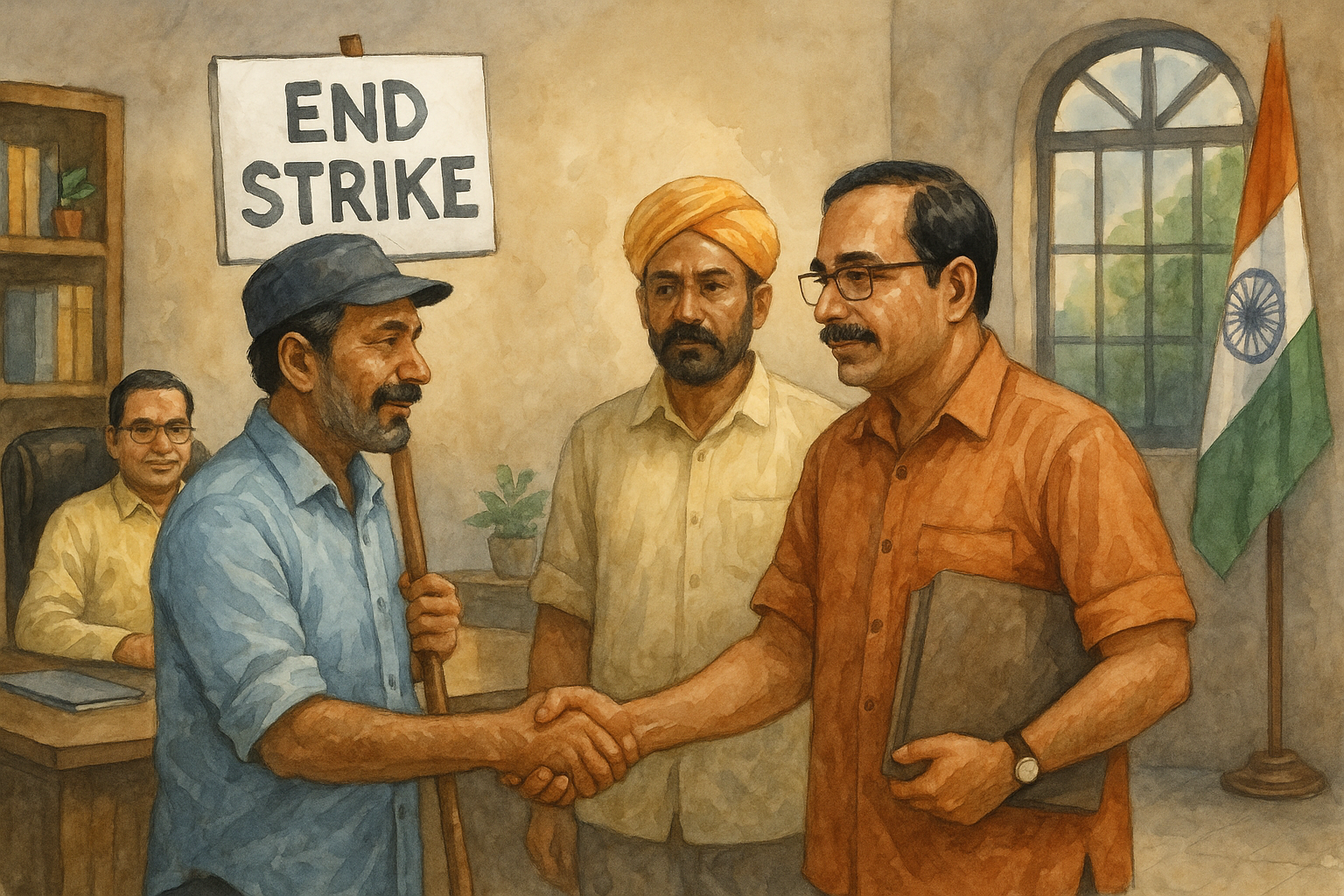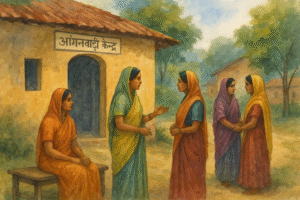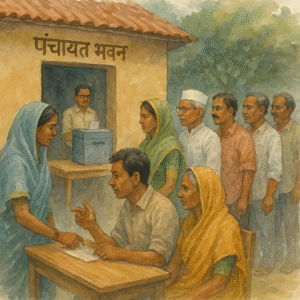The Patna High Court, in a short but important oral order dated 07 September 2022, recorded that a strike by employees’ bodies and unions had been called off, and consequently disposed of an interlocutory application (I.A. No. 17 of 2022) filed in Civil Writ Jurisdiction Case (CWJC) No. 353 of 2021, which was heard along with connected writ petitions. The Bench comprised Hon’ble the Chief Justice and Hon’ble Mr. Justice S. Kumar.
In the course of hearing, learned Senior Counsel appearing for the applicant informed the Court that, pursuant to prior orders of the Court, a meeting had been convened and the bodies/unions representing employees across different organisations had unanimously resolved to call off the strike. This development was also formally supported by an affidavit dated 07.09.2022 sworn by the President of a concerned employees’ federation, which the Court took note of while concluding the matter. On that basis, the interlocutory application was disposed of.
Although brief, the order illustrates a key aspect of writ jurisdiction: Courts frequently facilitate resolution of ongoing public disputes—including strikes that disrupt essential civic functions—by nudging the parties towards dialogue and by ensuring that any settlement or decision to cease agitation is placed on record through an affidavit. In this instance, once the Court was satisfied that the strike had been called off and that an affidavit confirmed the same, there was no surviving interim grievance to adjudicate in the application; the I.A. was therefore disposed of as infructuous or unnecessary in light of compliance.
The proceedings were not confined to a single writ; the I.A. in CWJC No. 353 of 2021 was heard “with” three other writ petitions—CWJC Nos. 9639, 12598, and 16206 of 2021—signalling that allied issues about employment and public administration had been clubbed to avoid multiplicity of proceedings. Clubbing helps maintain consistency and judicial economy, particularly where a common development (like withdrawal of a strike) removes the need for interim coercive directions across related cases.
The order was passed by a Division Bench headed by the Chief Justice, which generally indicates institutional urgency or significance affecting larger public interest—such as continuity of municipal or governmental services. Where strikes by public employees threaten essential functions, courts try to balance legitimate labour concerns with the public’s right to uninterrupted services. Here, rather than dwelling on legality of the strike or issuing punitive directions, the Court recorded the voluntary recall of the strike and closed the interim proceedings. This approach underscores judicial preference for consensual de-escalation backed by sworn statements, ensuring both accountability and expeditious restoration of normalcy.
From a procedural lens, the affidavit placed by the employees’ federation’s office-bearer served as the factual foundation to conclude the I.A. Courts rely on such affidavits to confirm whether directions have been complied with or whether factual developments have overtaken the need for interim relief. Once the strike was called off and the parties signalled acceptance, continuation of the I.A. would have served no purpose; disposing of it preserved judicial time and avoided unnecessary pronouncements on issues rendered academic by subsequent events.
The representation across parties was extensive—counsel appeared for petitioners, the Union of India, the State of Bihar, the Patna Municipal Corporation (PMC), and an intervenor—showing that the strike and its fallout had ramifications across multiple governmental layers and civic bodies. The presence of the Advocate General and Additional/Assistant Advocates General for the State further highlights the matter’s public dimension.
In sum, the Patna High Court’s order is a concise judicial record of conflict de-escalation: it acknowledges that the unions withdrew the strike after a Court-facilitated meeting, relies on an affidavit to authenticate this development, and, on that basis, brings the interim application to a close. The parent writ petitions—with their broader prayers—would continue as per law, but the immediate exigency tied to the strike no longer required interim orders.
Significance or Implication of the Judgment
- For the general public: The order demonstrates how the High Court can quickly stabilise public services by encouraging a negotiated end to industrial action and by formally recording the withdrawal of the strike. This reduces prolonged service disruptions and ensures that civic bodies can resume normal operations without contentious interim litigation.
- For government bodies and municipal administrations: The case is a reminder to maintain structured engagement with employees’ unions and to promptly apprise the Court—via affidavits—of any resolution. When strikes end, communicating that fact to the Court helps close interim proceedings and prevents avoidable further directions.
- For employees’ unions: The order shows that once unions take a collective decision to call off a strike, filing a sworn affidavit is an effective means to secure closure of interim restraints or pending applications. It also preserves goodwill with the Court for the ongoing adjudication of the main issues in the writ petitions.
- For legal practitioners: The matter underscores the utility of clubbing related writs so that a single development—here, strike withdrawal—can resolve interim issues across the batch. It also illustrates the importance of placing timely affidavits on record to signal compliance or changed circumstances.
Legal Issue(s) Decided and the Court’s Decision (with Reasoning)
- Whether any interim relief or further coercive directions were required in light of the unions calling off the strike.
• Decision: No; the interlocutory application was disposed of.
• Reasoning: Since the employees’ bodies had unanimously resolved to call off the strike and an affidavit dated 07.09.2022 confirmed this, there was no subsisting interim dispute warranting judicial intervention. - Procedural propriety of concluding the I.A. on the basis of an affidavit confirming changed circumstances.
• Decision: Appropriate; the Court recorded the affidavit and closed the I.A.
• Reasoning: Courts routinely rely on affidavits to register compliance or factual supervening events that render interim prayers infructuous.
Case Title
CWJC No. 353 of 2021 with CWJC Nos. 9639, 12598, and 16206 of 2021 — Petitioner(s) v. Respondents (batch matter).
Case Number
CWJC No. 353 of 2021 (with CWJC Nos. 9639/2021, 12598/2021, 16206/2021).
Citation(s)
2021(2) PLJR 721
Coram and Names of Judges
Hon’ble the Chief Justice and Hon’ble Mr. Justice S. Kumar.
Names of Advocates and who they appeared for
- In CWJC No. 353 of 2021
• For the petitioner(s): Mr. Y.C. Verma, Senior Advocate; (petitioner also present in person)
• For the respondent(s)/Union of India: Dr. K. N. Singh, Additional Solicitor General; Mrs. Kanak Verma, Central Government Counsel
• For the State of Bihar: Mr. Lalit Kishore, Advocate General
• For Patna Municipal Corporation (PMC): Mr. Bindhyachal Singh, Senior Advocate; Mr. Vipin Kumar Singh, Advocate; Mr. Janmejay Giridhar, Advocate
• For the intervenor: Mrs. Archana Sinha @ Shahi, Advocate. - In CWJC No. 9639 of 2021
• For the petitioner(s): Mr. Sumeet Kumar Singh, Advocate
• For the respondent(s)/Union of India: Dr. K. N. Singh, ASG
• For the State of Bihar: Mr. Lalit Kishore, Advocate General. - In CWJC No. 12598 of 2021
• For the petitioner(s): Mr. Sriram Krishna, Advocate
• For the State of Bihar: Mr. Lalit Kishore, Advocate General; Mr. Yogendra Prasad Sinha, AAG-7. - In CWJC No. 16206 of 2021
• For the petitioner(s): Mr. Devi Das Srivastava, Advocate
• For the respondent(s)/State of Bihar: Mr. Lalit Kishore, Advocate General; Mr. Ajay Bihari Sinha, GA-8.
Link to Judgment
MTUjMzUzIzIwMjEjNjQjTg==-bCGWipJL7Vg=
If you found this explanation helpful and wish to stay informed about how legal developments may affect your rights in Bihar, you may consider following Samvida Law Associates for more updates.








